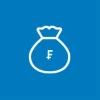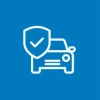According to Swiss Statistics, the average Swiss household has a gross monthly income of around 9800 Swiss francs (2020 statistic).
Swiss households: Expenses
The average Swiss household spends 1411 francs per month on housing and power, 1218 francs on taxes, 989 francs on social security contributions, around 630 francs on transportation, 641 francs on food, 138 francs on clothing and shoes, and around 175 francs on mail and telecoms.
Compulsory health insurance slaps another 661 francs on average onto the list of expenses. Premiums for other insurance fees come to around 317 francs per household and month.
Swiss household income: How much is left?
The average Swiss household is left with around 1800 francs above expenses at the end of each month. That means the average household can, in theory, save around 21,600 francs per year.
Planning your budget correctly is absolutely essential to successfully saving money in Switzerland. Many people cringe at the thought of budgeting because it sounds like a lot of work. But following a few simple guidelines can make creating a budget a quick and painless experience.
1. Divide your costs into groups
Household budgets are normally divided into 3 parts: fixed expenses, running expenses and occasional expenses. This provides a better overview of where your money is going.
Fixed expenses are recurring costs like rent, taxes, insurance premiums and telco bills.
Running expenses are everyday costs which you come up against on a regular basis, but which aren’t fixed to certain amounts or time-frames. Examples of running expenses include food, transportation and toiletries. These costs are flexible because, although you do have to eat (for example), you can choose between cheaper and more expensive groceries.
Finally, there are the occasional expenses. These normally aren’t absolutely necessary, and can vary in a big way. Examples include leisure spending, vacations and interior decor.
2. Use a budget tool
If you want to do more with your money, it is crucial that you have an accurate overview of your financial situation at all times.
With the Swiss budget tool from moneyland.ch, you have a clear overview of your budget.
3. Set goals for yourself
Realistic savings goals are helpful and motivating. It is easier to stay motivated if you make a series of shorter-term goals which you can reach fairly quickly, rather than setting a very long-term goal right from the start. Your household budget forms the basis for your savings plan. Multiply the amount of money you can put aside after covering all expenses in your budget by a set number of months or years to calculate savings goals.
4. Optimize your impulse spending
If you want to or need to save, you will have to streamline both your ongoing and your irregular spending. You save the most when you cut out all expenses that you don't absolutely have to make.
5. Optimize your fixed expenses
Fixed expenses are generally the most urgent, but even these can be radically reduced. For example, you may be able to find a more affordable home. One of the easiest fixed costs to save on is health insurance. Switch to a more affordable health insurance provider.
6. Check your housing expenses
Calculate your combined fixed housing expenses, including electricity and rent. Ideally, the total of these costs should not make up more than one third of your income.
7. Cut your insurance premiums
Your health insurance premiums are not the only insurance costs that need regular review. Go over every insurance policy you have and ask your which of them are really necessary. Choose the most affordable policies for the insurance you really do need. Avoid overlapping coverage.
8. Cut your banking expenses
Banking fees can also cut into your budget. Compare banking services regularly and choose the bank which offers the best value for your needs.
9. Optimize your savings
Choosing the right options for your savings is important to reaching your savings goals. These may include savings accounts and pillar 3a accounts. Compare interest yield rates before settling on a bank to save with.
10: Avoid borrowing money
Only take out personal loans if it is absolutely necessary. Carrying debt is expensive. Lenders charge effective annual interest rates equal to as much as 10 percent of the amount you borrow. Compare the interest rates of lenders ahead of time and choose the most affordable loan provider.
More on this topic:
Budget tool on moneyland.ch
How Swiss households can save money
Swiss insurance comparisons
Bank account and card comparisons

 Deal of the Day
Deal of the Day 














